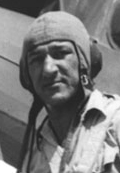 Syd
Antin
Syd
Antin Syd
Antin
Syd
Antin
Boston, Massachusetts
Combat Record
One REAF Spitfire damaged
Story
Syd Antin flew 107 sorties, mostly ground attack, in a P-47 with the 80th FG, 10th Air Force in the CBI theatre during World War Two, and amassed 1,000 hours in the type. That's not entirely correct, because according to the USAAF, Sid Antin flew those missions - which explains why no one seems to be certain whether his name is Sid or Syd. His parents gave him the name "Sydney" and he used that until his first USAAF payday. He signed for his paycheck as Sydney, but the name on the check was "Sidney" and he was refused his paycheck. At that point, Antin says, Syd became Sid.
In early May 1948, a Zionist female friend of Syd's sister, upon learning of Syd's piloting skills, commented that he was exactly the sort of talent the future Israel could use and put him in touch with recruiters.
The Boston recruiters gave Antin the particulars of the main recruiters in New York City.
I go on an airplane and went to New York, went to the hotel, went to the room that I was directed to. I knocked on the door.... When (this guy) opened the door, he opened it about two inches and had a chain on it. He made me repeat who I was looking for and he said, "Please wait." Then he closed the door, put a chain on - I could hear it - and he was gone for a couple of minutes. I banged on the door - I was impatient - I banged on the door and he came back and I said, "Look, I'm either at the right place or I'm not. If this individual is here, I'd like to see him, if he's not, I'll leave." At that point, they ushered me in rather rapidly.
Although I never heard any names, they had one hell of an operation going there. They had a suite of rooms. They had people operating at desks, typing away at different things like mad. You'd think it was a huge insurance company - they were really busy. They took me into a small room and interviewed me. I had been told previously to take my (log book) with me. I took that (log) and this guy looked through it and he said, "Hmm. You are who we need."
That's when I got my airplane ticket to Rome and they gave me the name of a man who was presumably my uncle, in case I was questioned. I was going to visit him in Rome. One of the remarkable things about that was in those days it took a week, sometimes four, to get a passport from the time that you put your application in. I got my passport the very next day. They called somebody they knew from that office in the department, the right department, and believe me when I tell you they had some influential connections, because the next day, that passport was ready. I had no problem picking it up. I remember I picked it up and went to the airport. They had a reservation made for me on TWA.
Antin's trip to Israel was a bit more eventful than most other 101 Squadron pilots. He flew to Rome in mid May, on a TWA Constellation, unknowingly sitting right next to Red Finkel.
We started to talk to each other and I don't remember exactly how it happened, but little by little enough of what we each said gave us both the clue that we're both going to the same place for the same reasons. We were both fighter pilots going to Israel to fly in their little war, and of course that made us real close.
Antin and Finkel belonged to the second group of volunteer pilots to be trained in Czechoslovakia, a group that made it to Herzliya in mid June. Leo Nomis called Antin "tough, wiry, (and) oft-times stoical" (Nomis and Cull 1998). Finkel and Antin finished their S-199 training at Ceske Budejovice in early June and hitched a ride on a LAPSA C-46 flying from Zatec for Israel with a planned stopover in Ajaccio, Corsica.
An iced-up carburetor forced the C-46 to set down early at an Italian airbus at Treviso, in northern Italy. The base commander had previously proven friendly to Israeli aircraft crews and he had never bothered searching their planes for contraband cargo. Again this time, the base commander took the LAPSA captain's word that they were flying civilian cargo to the Americas - but when he left the area, one Italian soldier, under his own initiative, peeked into the fuselage and saw Finkel and some crates. Antin was also on board. The soldier pointed a gun at Finkel and demanded that he open the boxes.
Finkel, thinking quickly, refused to do any such thing until the base commander returned and used the time he had to collect any potentially incriminating documents in the cockpit. Among the papers, Finkel found an envelope addressed to the 101 Squadron commander from Dr. Otto Felix, the Israeli contact in Czechoslovakia who met many arriving 101 Squadron recruits in Prague. The letter read: "Aaron Finkel. Typical American. Oversexed. To be watched."
When the Italian commander and/or questora (regional chief of police) returned, he insisted that Finkel open a crate. The aircrew and passengers tried to convince the Italian authorities that the crates carried surveying equipment.
Now, anybody who has ever seen an ammunition box knows what the hell is in it. So they had a pretty good idea when they saw the ammunition boxes. The machine guns were in much longer boxes and they were in two layers. Even though we told them it was surveying equipment, they insisted on opening up the box. When they took the cover off, the top layer had the tripod for the machine gun and I think the sight or something else in there. But the guts of the machine gun were not in the top layer. When they saw the tripod, we tried to say, "See, that's for the surveying equipment." Understand, too, the language difficulty. It was tricky. Then the guy motions, "Open up the rest of it," and when we did, of course, there was that ugly air-cooled barrel - you couldn't call that surveying equipment. It was pretty obvious what it was.
See, they thought we were running guns for communists somewhere. It's what they were worried about - that's the word I got, anyway - and that's why they grabbed onto us and locked us up until they found out different. (Antin, pers. comm.)
Oops. The Italians decided to take crew and passengers into custody. Finkel asked to make a phone call and the Italians granted his request. He called Danny Agronsky, publicly the local LAPSA official and secretly in charge of the Haganah's European air operations. Upon completing his call, Finkel and the others from the C-46 were hustled toward the base jail. Finkel, Antin, and Don Kosteff, the C-46 pilot, shouted indignantly that they were Americans and could not be treated in such fashion. The Italians asked them if they wanted to see the US consul. As the US had maintained an arms embargo against the Middle East and any American citizen serving in the armed forces of another country could lose his citizenship, all three quickly declined, to the surprise of the Italians. Agronsky secured their release, but not before they had spent three nights in jail.
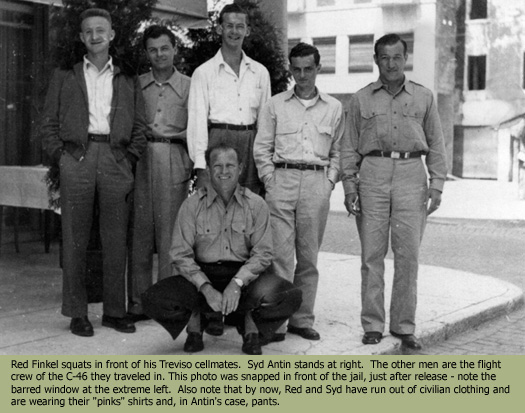
Upon release from prison, the ex-cons went to a hotel in Treviso. They visited a house of ill repute that greatly impressed Antin:
You have never seen anything like it. It was a huge mansion-type thing - marble columns in the front, very ornate. It just represented all kinds of wealth. It was just as fancy as it could be. Inside, velvet drapes - it was just a beautiful mansion.
When we were released from the Italian prison there, they assigned a guard to stay with us, right with us, 24 hours a day. Well, we had to take him with us in order to go. We got in this place and sat down at these marble-top tables. They gave us cards, we played cards. They served us wine. The girls start trooping in one at a time dressed in very flimsy attire - the reason being obvious. We just went on drinking and carrousing, playing cards, playing with the girls, and one by one of course each of the guys picked one of the females to go to a room. Of course, the guard - we were feeding him a drink every time we had one and he got polluted. I mean he was really polluted. He finally passed out on the sofa. None of us got in that bad a shape like he, because we fed him whiskey intentionally.
Eventually, we had our fun and departed the place with him still passed out on the sofa. We went back to our hotel. We found out the next day that guy was reamed out when he went back to the prison. We never heard whether he was fired, or they had a firing squad, or what, but he did get in a lot of trouble, we did hear. (Antin, pers. comm)
From Treviso, the group took a steamboat to Venice (probably, Antin told me they took a steamboat "across the bay") in order to catch a flight to Haifa on a Jewish-owned South African airline that Agronsky had arranged.
We had gone through our good clothes and we were wearing all these parts of uniforms. We arrive in Haifa, the door of the aircraft is opened, and the first thing we see is a big, fat United States Army major, in full uniform with a UN armband around his arm. At that time, the UN had passed a requirement that no male of military age could be entered into Israel....
Well, this big, fat major interviewed each of us as we got off the aircraft. We all had a story. I had an uncle in Tel Aviv that I was gonna visit - I was a tourist. Now, try to convince anybody I was a tourist the way I was dressed, right? It was a laugh, but we had to say something and each of us had a different story. The fact is it was pretty damned obvious what we were there for.
Anyhow, they carted us off and put us in this fenced-in area that the UN had authority over and they confined us because we were not allowed to enter the country according to their rules. Anyway, during that very first night, the Israelis smuggled bodies in for each of us and smuggled us out. We were on our way to the Hundred-and-First Squadron by early morning. (Antin, pers. comm.)
Antin doesn't remember when he reached the squadron, but it was after the Altalena incident. Once active with 101 Squadron, Antin developed an unfortunate habit. Modi Alon tried to break him of it:
On one occasion, he (Alon) reamed my ass up one side and down the other, but I didn't hold it against him because I deserved it. You know, I had come in and I had really racked over (buzzed) the base.... I came down right over the tents and blew a couple of tents over. Buzzed the hell out of it, that's right. And not only once, but several times. He was kind of pissed off. He thought it was unreasonable, and it was - I came awfully low. (Antin, pers. comm)
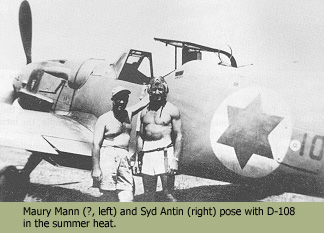 At
17:30, July 18, the last day of the summer offensive, Modi Alon led Antin and
Rudy Augarten from Herzliya in three S-199s to attack an Egyptian armored column
at Bir Asluj, west of Beersheva. It was Augarten's first combat mission in Israel.
He comments:
At
17:30, July 18, the last day of the summer offensive, Modi Alon led Antin and
Rudy Augarten from Herzliya in three S-199s to attack an Egyptian armored column
at Bir Asluj, west of Beersheva. It was Augarten's first combat mission in Israel.
He comments:
My first turn to fly came up with Modi Alon and Sid Antin. They had bombs on their planes; I didn't. They took off. I forgot the TMFRTS code and took off. You normally have to take your trim all the way back so when you run up your prop, it holds the tail down. I had trim set all the way back which had an effect like somebody pulling back on the stick. When I pulled full throtttle, I went down the runway 150 to 200 yards and the plane started to come up but hadn't enough flying speed. One of the wings stalled, going to the left side. Then I realized what happened. I counteracted it by pushing down on the stick to keep the plane from climbing too fast.
I was fighting the stick. The plane was in a slow turn to the left. There was a tree 200 to 250 yards off the runway and they tell me my wing brushed through. But I got off. (Rubenstein and Goldman 1978)
The Israelis dropped their bombs and made three strafing passes. On the return to Herzliya, Alon flew lead at 6,000 feet, with Augarten off to his left and Antin to his right.
Antin spotted two or three REAF Spitfires cruising on a parallel course to the left and called the others on the radio.
Modi was closest, he went after the first one. Rudy was next, 'cause they were on his side, and he went after the second one, but he was out of ammunition. He spent all his ammunition that we were returning from.... So he slid over, I told him, "Move over," and I slid behind the one that he had latched on to, and I still had some ammunition. So I started firing at him and it was a very brief dogfight. I saw some pieces come off him but I didn't knock him down. He kept on going. He got back.
Modi knocked down his, so we got at least one of them for sure.
After Augarten peeled off to come up behind his targeted Spitfire unseen, he had depressed his trigger, but nothing happened. He dove out of the way. Alon had hit a Spitfire Mk Vc, REAF serial number 610, flown by W/C Said Afifi al Janzuri, the fighter leader at Al Arish. The Egyptian tried to crash-land his plane in the hills below, but died in the attempt.
All three S-199s escaped without damage - until they tried to land at Herzliya. Alon landed first and spun off the runway to the right, nearly flipping over. Augarten, blinded by the setting sun, nearly hit the other two as he attempted to touch down, but pulled away in time. By the time he came around again, he'd run out of fuel. Some sources claim Antin nosed over on landing, but he is adamant that he did not.
Antin and Finkel flew a pair of S-199s on patrol Aug. 1, out of Netanya.

Amid the war, Antin found time to practice his horseback riding - "great fun", he called it. One weekend in late summer, he, Lichtman, Nomis, and a few others headed for the beach. Nomis recalls:
We take the jeep and Sid Antin goes across the lane to the farm corral and borrows the white horse, Gebor, and rides him bareback down the hill. At the beach some of the Communications girls from camp are there on the sand and Sid Antin gallops Gebor past them to the tide swirls and the hooves throw water high in the air. (Nomis and Cull 1998)
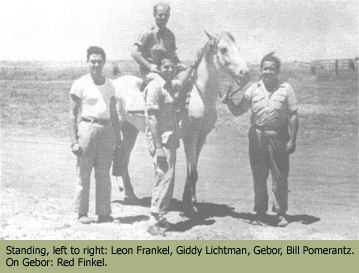
The beach wasn't the only fun for the pilots, although it may have been the most wholesome. Antin was the only squadron pilot who could handle a drunk and unruly Leo Nomis:
Let me tell you, the laws they passed, years back, making it illegal to give an Indian whiskey alcohol was certainly justified judging by the way this guy handled it. I tell ya, he was the nicest guy in the world. We all loved him. But when he got drunk, he was a terror. Man, I tell you, he would fight anybody, break up the goddamned place - he was absolutely impossible.... It turned out that I was about the only guy that handle him. Of course, I was known as the "shtarker" (tough guy) in the outfit. And when Leo got drunk and acted up like that, my physical condition paid off. Boy, I'd climb up his back and beat the shit out of him. A couple of times of times I had to beat him bloody - not because I had any hate for him or anything like that, I just couldn't control him. It was impossible, without trying to knock him out, to get him to stop. (Antin, pers. comm.)
Antin drew tower officer duty Oct. 16, and in the afternoon he awaited the return of Modi Alon and Ezer Weizman from a ground attack mission against the retreating Egyptians near Ashdod. Alon had radioed in for landing clearance and Antin granted it. Syd Cohen and Maury Mann sat in Spitfires, awaiting permission to take off.
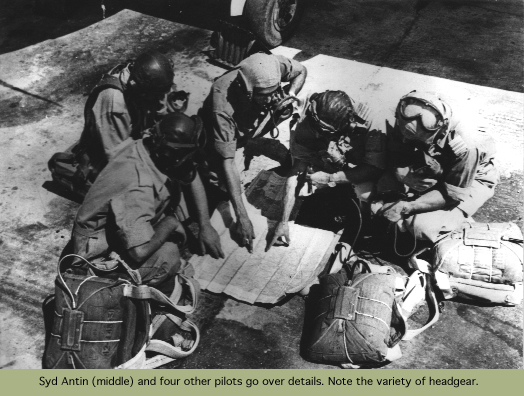
Before Alon even entered the landing pattern, Antin spotted an unidentified aircraft through gaps in the coastal dunes to the west and radioed the news to Alon, who interrupted his maneuvering to check it out - Antin says "he went after it balls out." Once he had identified the bogey as a friendly light plane based up at Haifa, Alon returned to Herzliya but had to repeatedly buck the plane in high-G maneuvers in attempts to get the landing gear down and locked. Alon had managed to get one wheel down when Antin noticed a wisp of smoke coming from the S-199. He asked Alon to check the engine temperature, and Alon radioed that it seemed fine. Alon's second wheel came down and as he came back over the field to enter a downwind leg for landing, his airplane gently nosed over right when he was over the field. After a moment or two, Antin realized Alon was not correcting for it and shouted over the radio, "Modi, Modi, pull up! Pull up!"
No response whatsoever. He just slowly nosed over and went right straight down into the ground, right on the field. And of course it exploded and ammunition was going off all over the place. It killed him instantly.
Antin thinks Alon pushed his engine too hard in the chase after the bogey and overheated his engine, leading to that wisp of smoke and glycol fumes in the cockpit. He thinks Alon passed out from the fumes as indicated by his unresponsiveness and the way the S-199 so effortlessly augered in.
Syd Cohen took over as 101's commanding officer and Antin, like the others, were impressed with his leadership:
Syd Cohen was a great guy. Everybody loved him. He commanded a great deal of respect. He had a great deal of wisdom for his age and experience and people respected that.
The next day, with battles raging along the Egyptian front, the squadron called on Antin and Giddy Lichtman to hit the Egyptian fort at Iraq al Suweidan (near Negba, on the Hebron-Ashkelon road), the first time the weapon would be used by the Israeli air force. Additionally, Israeli ground forces engaged just outside the town had come under attack by three REAF Spitfires. Antin flew wing man without bombs, both pilots flying S-199s - Lichtman in D-117. Taking off in late morning, the pair reached the target about 20 minutes into the mission. Lichtman remembers:
Syd Antin and I were briefed to drop napalm and strafe the Iraq al Suweidan area, where a big tank battle was in process. We took off and headed south towards the coast. We then headed inland, at very low level, and flew over Iraq al Suweidan, where I noticed the huge British-type fort with its flat roof, with very many AA guns firing accurately at us.
I made a wide circle out to sea. Syd indicated he would fly top cover for me this time. I came in low over the sea and headed for the fort, pulled up over the roof and dropped my napalm and looked back - the napalm had landed right on the roof. There were about 200 vehicles (in the town) and many troops and the antiaircraft fire seemed very accurate. I violated all basic military principles and decided I'd come round again. I made steep ground-level turn and hit the same area.
I kept at treetop level and headed for the tank battle, which I saw going on to the east and the south. I knew the Israelis had only a few tanks, so I selected a bunch of tanks which were grouped together. I circled on the deck, outside the battle area, and came in from the sun, knocking out at least, I think, five or six tanks. After my last pass, I ended up again over the fort, where there were still many troops, and pulled up to 100 feet to admire the damage I had done, then (dove) down to about ten feet. It then seemed like the whole world was shooting at me and I suddenly noticed the smell of burning oil in my cockpit.
A few seconds later, I checked my temperature - the needle was moving in the wrong direction. I attempted to gain altitude and did, very slowly, and I got up to about 300 feet, heading north, but couldn't get any higher. Bailing out was out of the question as, if caught, the Arabs would cut your balls and pecker off, and I didn't have a taste for that at all!
Flashes of fire appeared around my engine cowling, while oil started to pour around the canopy and smoke started to come into the cockpit. My visibility began to decrease, I was losing power, and - in order to maintain 300 or so feet - I had to fly in a nose-up attitude. I contacted Syd and told him my status. I opened the canopy and immediately I was covered in drops of steaming oil. My goggles were covered and my face was burned.
I took off my goggles and shaded my eyes with my left hand. I could see Syd on my left wing. He indicated that we were only about five miles from base. I put my gear down, but Syd indicated I should put it up. I was down to about 150 feet or so, when he indicated we were landing the wrong way on the runway. At about 20 feet above the deck, I saw the runway. I cut the engine and made a wheels-up landing. It was a good landing as, in a day or two, the aircraft was again flying. (Cull et al 1994)
It is impossible that Lichtman "opened the canopy" on the S-199 which like all Bf 109 variants used a clamshell canopy set-up. It is more likely that he meant he jettisoned the thing. Furthermore, Antin specifically remembers landing on a paved runway, which would not be the dirt runways of Herzliya, 101 Squadron's base at that time. Antin thinks they landed at Chatzor:
We had completed our mission and he got hit by ground fire. We were heading northand we were back in our territory but certainly not back at our base. I think we were just about over Chatzor.... I remember it was a cement runway.... Giddy had to get it down, he would never have made it back to the base because it was still a few miles north.
He put his gear down, making a long approach. His engine was acting up real bad. He couldn't see much - we were talking on the radio. When he put his gear down, I yelled at him to pull his gear up because if you making a dead-stick landing, which he was, and you've got the gear down, you don't have any second chance. If you're overshooting or undershooting or whatever, you can't go around and try again like you can under normal conditions. So I told him, "Giddy, get your gear up and force it on the ground if it wants you to keep flying because once you hit the ground and scrape your belly, the friction will stop you." I didn't go into all the details but anyway, that's what he understood, I'm sure. He agreed and pulled his gear up. He made a lovely belly-landing and, as you know, he walked away from it - didnt get a scratch. And the airplane wasn't hurt that bad, either. If he had kept his gear down, there's no telling how it might have ended up. If you go off the end of the runway, you can flip over and get killed real easy. (Antin, pers. comm.)
Lichtman had enriched the fuel mixture to run the engine at as low a temperature as possible and the damaged D-117 held up, even through the downwind belly-landing. The inspection document state that the aircraft sustained flak damage to its "cylinder exhaust stack, right wing, and in right radiator, while loss of coolant caused internal damage to engine."
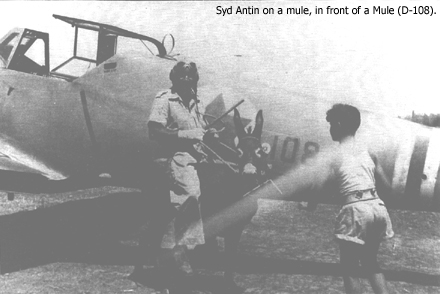
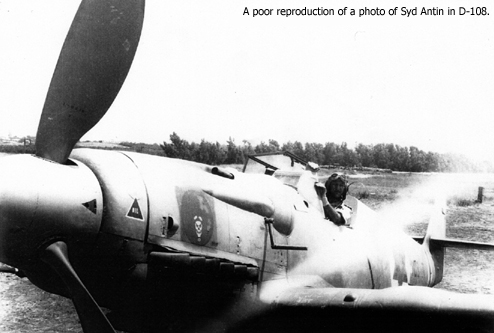
Antin left Israel after the October truce but returned when he heard that 101 Squadron had tangled with the RAF on Jan. 7, 1949. The next morning, Antin boarded an airplane heading back. The war ended, but he stayed on to help train the up-and-coming class of native Israeli pilots. He left Israel some four or five months into 1949.
Back in the US, Antin got into the soda bottling business for a while and then worked with his brother. When the Korean War broke out, Antin, a USAF reservist, was called up for duty. The USAF needed transport pilots and Antin found himself assigned to a twin-engine C-119 troop-carrier outfit in South Carolina.
I didn't like the idea, especially at first because to me anybody that flew more than one engine was a truck driver. But, anyway, I was stuck with it. I got to like it because I could push a button up in the cockpit and the damned crew chief would come up and bring me coffee if I wanted it or whatever. That got to be comfortable. That's really nice. You can't do that in a fighter airplane.
Once Antin had reached six years of USAAF/USAF service, he decided to go career: "Flying was the thing I enjoyed most, of everything that I've tried in all my life. And I enjoyed it so much, I decided I would stay in the Air Force and finish my 20 and get my short retirement." Sometime later, Antin became an instructor pilot in the C-47, but as he got older and flight assignments became rarer, he went to communications officer school and became one, with secondary (and rare) flying duty.
After taking his USAF retirement as a Major and moved into the federal civil service doing the same job. Antin became eastern region chief of Military Affiliate Radio System (MARS). Hearing problems forced him to retire from civil service as well.
Antin and his sons began a business at first building and then selling large-screen TVs and within nine years had five stores in the Kansas City area.